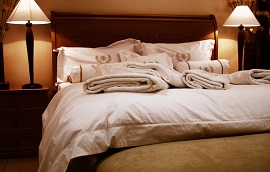Most of us appreciate that quality sleep is the key to a productive day. Good quality sleep is also needed for a stable mind and safety, but it is not always easy to achieve. While the odd bad night of sleep is common, if you are struggling to maintain a routine of quality sleep, you may find these top tips beneficial.
Prepare Your Bedroom Air:
While the perfect temperature for sleeping varies for everyone, usually a cooler temperature is preferable. Trying to sleep in a room that feels overly hot is almost impossible, whereas a cooler temperature encourages us to snuggle up and drift off. For this reason, it is important to prepare your bedroom air to encourage rest and relaxation. Before bedtime, set your thermostat to your ideal sleeping temperature. This may be trial and error, but 77 or 78ºf is a good starting point.
Additionally, you need to check the air quality inside your bedroom. Is there a musty or stale smell? Does the air feel dirty? These aspects can compromise the air quality and prevent you from relaxing. Fortunately, modern HVAC systems include specialized air filters that can not only keep the temperature at a comfortable level, but can ensure that the air feels clean and healthy. If you are struggling to sleep, check your air filter does not need cleaning or replacing. You may find that you feel more well rested and clear headed in the morning just by changing the filters.
Clear the Clutter:
A clean and organized bedroom will help you to clear your mind and prepare for sleep. If your room is serious need of a de-cluttering, you are unlikely to feel a sense of relaxation when you go to bed. You may wish to consider investing in storage solutions, so any items can be neatly tidied away, creating fewer distractions for you. While you are spring cleaning, why not donate clothing, books, and accessories you no longer need.
Eliminate Stimuli:
These days, many of us consider bedtime a great time to check emails, update social media and other stimulating activities. This is a terrible way to wind down and prepare for sleep. You should eliminate this stimulus and establish a routine of no television, computer or cell phone use for an hour before bed. When you feel ready to go to sleep, turn off the lights and allow yourself to relax and drift away.
Keep Your Bedroom Dark:
Research has shown that any light can reduce the amount of melatonin produced by the body. This is a sleep hormone released to help you to fall asleep and rest. Unfortunately, this means that if a light is invading your bedroom from outside or other areas of the house, it is compromising your rest. You need to keep your bedroom dark, so use draft snakes to eliminate light from other areas of the house and invest in blackout blinds or drapes for your bedroom.
Create a Comfortable Sleep Space:
Finally, you need to assess whether you feel comfortable and relaxed in bed. Have you been meaning to replace your pillows and mattress for a while? If your sleep space does not feel comfortable, you will experience poor quality sleep. Find pillows and a mattress that is perfectly soft or firm to suit your preferences. This will create an inviting sleep environment and help to lull you to sleep.
